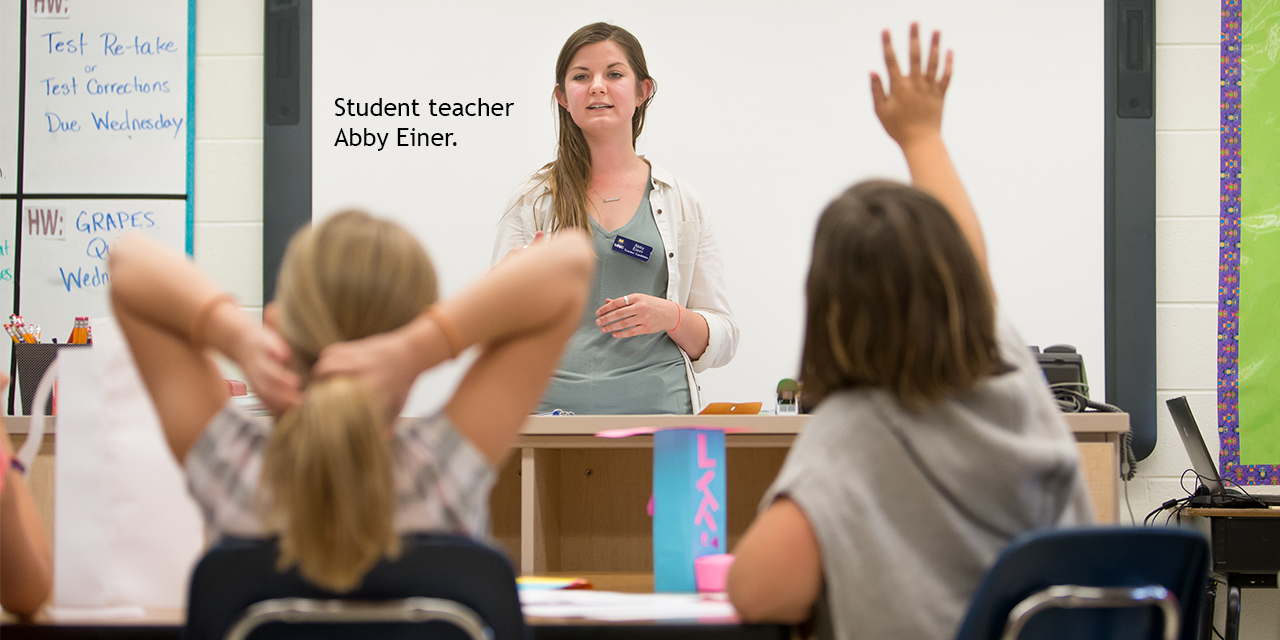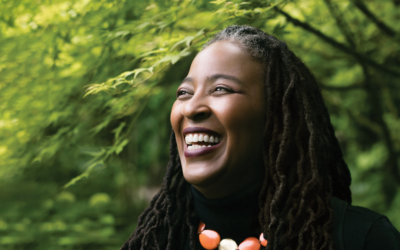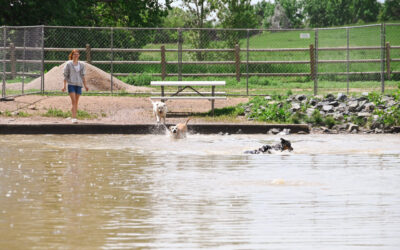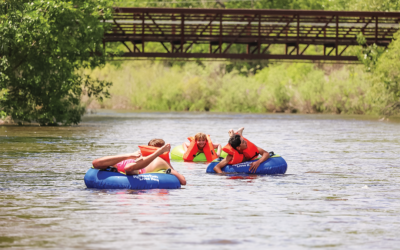From guns in school to social media, University of Northern Colorado’s Teacher Training Program is dealing with ever-complex issues.
Classrooms have changed in many ways. In years past, students sat in rows and listened as the teacher spoke. They learned “facts” from text books. Teachers asked questions and students answered them. Information about other places in the world came from the books provided.
Today’s classrooms are more complex environments with advances in technology, an increasingly diverse population and an internet where information can come from a variety of sources. Accordingly, teacher training has had to adapt and evolve. University of Northern Colorado’s Teacher Training Program is a perfect example of the evolutionary changes.
“We constantly evaluate our programs to be sure we’re preparing the best beginning teachers possible,” says Eugene Sheehan, PhD, professor of psychological sciences and the dean of UNC College of Education and Behavioral Sciences.

Sheehan says that, while Colorado requires 800 hours of student teaching as part of the teacher preparation program, UNC provides at least 840 hours of experience. “Part of our job is to provide a realistic view of what the job is going to be like and give them the knowledge and the skills to be excellent beginning teachers.”
The field of teaching has an advantage that most other industries don’t have, Sheehan says. As students coming up through elementary, middle school and high school, they see their teachers five days a week, eight hours a day. “By the time they reach high school, they have a good idea of what teachers deal with. They know about bullying, sexting. They know the issues of testing. So, by the time they come to college to become teachers, they are coming in with a realistic view of the job. That’s not necessarily true in other job or career areas.”
Sheehan adds that there are, of course, other issues that come into the picture. Guns and school shootings continue to be a hot topic. “They are tragic and heartbreaking and should not happen. But,” he adds, “from the statistical standpoint, they are relatively rare. Columbine happened 20 years ago so it’s not a new topic. But, this year, we organized active shooter training for our teacher candidates if they want to participate but it is not mandatory. I think our societal reaction of absolute sadness is appropriate and we should also look at the data. The big question remains: Why is it happening only in the U.S.? But that’s a discussion for legislators rather than teacher candidates.”
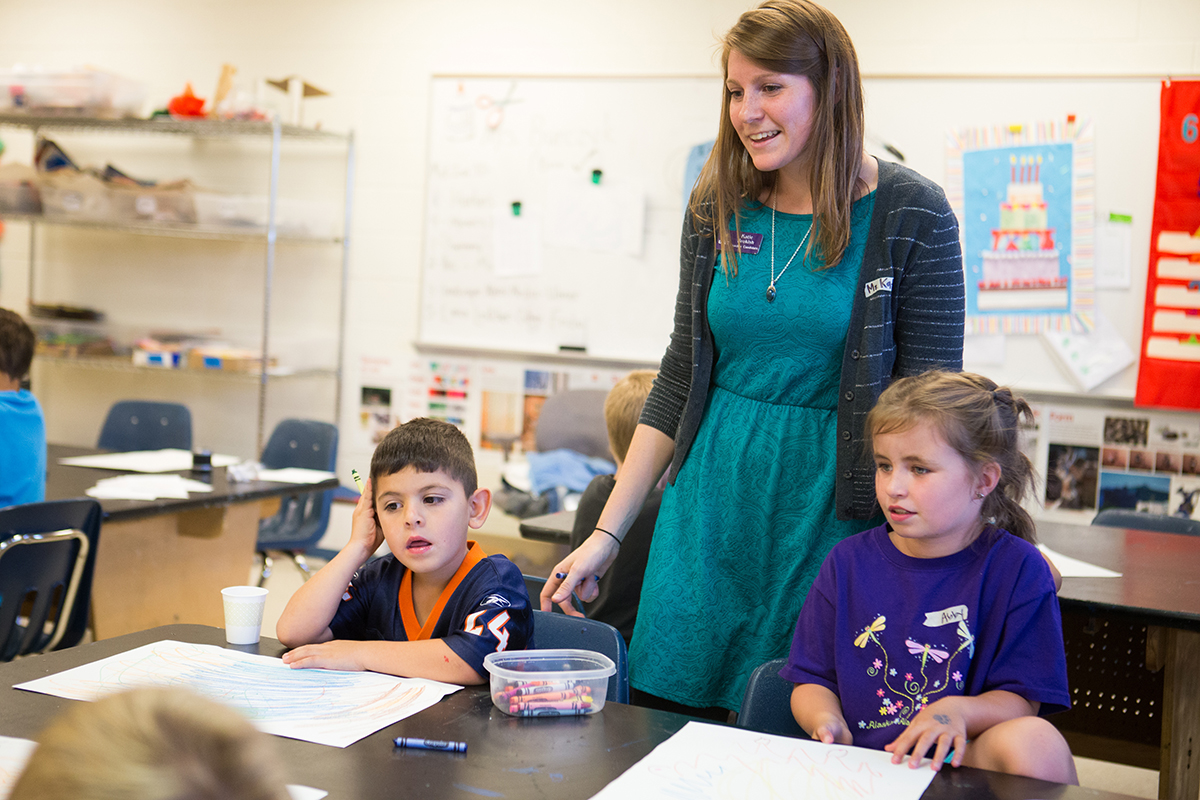
Student teacher Katie Brokish now teaches art class at Mountain View Elementary School.
However, he adds, he does not believe that arming teachers is the solution. “If we really want to focus on school violence, we should make a concerted effort to focus on the causes: bullying and mental health issues,” he says. ”Bringing more guns to school only heightens the likelihood of accidents and, in worst case scenarios, we’d have the possible equivalent to shoot-outs in classrooms. Arming teachers focuses on a symptom of the problem, not the causes. Also, I suspect most parents do not want armed teachers in their child’s classroom.”
Another important issue is the increasing diversity of students in the classroom. “The faces in the classrooms are changing in terms of culture and linguistics and our teachers need to be ready to deal with that. We are culturally adapting our curriculum and we’ve made changes that make training more appropriate for working with linguistically different students. We also need to add new materials.”
Suzette Youngs, associate professor in UNC’s School of Teacher Education and a primary organizer of the Future Teacher Conference agrees. “We have to have books and materials that mirror who’s in the class. And we also have to celebrate families in all the different realms: two dads, two moms, a grandmother raising a child. We don’t have the typical family unit anymore. And we have to not just tolerate but accept those differences. So, our teachers have to learn how to get to know their students.”
The issue of poverty adds another layer, Sheehan says. “Some students come in not having had breakfast or maybe their only square meal is lunch. Some come in wearing soiled clothes. I hear of teachers who keep a stash of clothes in their classroom, so they can quietly help the child feel welcome. It goes way beyond buying their own school supplies. It can also be about making sure they have some place safe to go at night.”
Then, of course, there’s technology. “Some teachers insist students have no have cell phones in the classroom, but I believe in bringing your own device,” Youngs says. “Most kids have cell phones so let’s put them to use. The effort should be active and purposeful. If we fight against it, it’s a losing battle. So, for example, I show student teachers how to use Twitter to follow children’s authors and see what they are saying.”
A new literacy track includes technology and literacy integration. Available courses provide extra time to focus on integrating technology effectively, Youngs says. “They offer new ways of thinking and learning about a variety of modes including image, videos, movies, and how to critically read articles on the Internet. We also have a track on social media that gets into bullying and copyright issues. An additional four courses are provided in math and special education.”
A new option offers a baccalaureate degree for elementary education. “Previously the degree was earned in another area and then licensing in elementary education followed. But now there are tracks specifically for this level of teaching,” Youngs says. The Elementary Education program emphasizes real-world classroom experience and includes 900 hours of field experience which is 100 hours above the Colorado requirement. “We are getting them into the classroom/field earlier and using good feedback from the teachers in an apprenticeship model.”
Morgan Bradley, in her junior year in UNC’s program, vouches for the learning/teaching opportunities. “My experience in the program has been phenomenal. I fell in love with the new literacies concentration immediately as I’m always learning and stretching my boundaries of what education can look like.”
Through a hands-on workshop model, Bradley says she learned how to effectively use genre and design, analysis guides, mentor texts, multimodalities, and more. “One of the most beneficial aspects of the program is first being involved as a student and then reflecting on the process as an educator.”
Bradley says what she has learned is applicable to the classroom and relatable to a real-life knowledge base. “They challenge me to think critically.” She also credits the professors in the program, calling them “seasoned and erudite educators” who work to create a future of high quality teachers.
Her particular passion is in transforming new literacies in rural education where she says she can bring her knowledge and skill set of multimodalities to redefine new literacies. “So often teachers are intimidated by new technologies and methods and I want to collaborate with both fellow teachers and the community to revive learning.”

The University of Northern Colorado Extended Campus
Go bears! The University of Northern Colorado was founded in 1889 in Greeley. Today, UNC offers more than 200 undergraduate, graduate, extended campus and online programs.
UNC Extended Campus gives students access to continuing education opportunities through convenient online learning or classroom-style learning in Loveland, Denver and Colorado Springs. They offer degree completion programs, master and doctorate degrees, certificates, licensures and endorsement options. The extended campuses and online options are ideal for working professionals that want to reach their career goals.
“A University of Northern Colorado education is built upon high standards spanning more than a century of academic excellence. Innovative curriculum and expert faculty will fuel your inspiration and spark success. No matter how you access Extended Campus, you are a partner and a colleague fully immersed in your chosen field of study.”
Kay Rios, PhD, is a freelance writer based in Fort Collins. She earned a doctorate in Education Leadership from Colorado State University. To comment on this article, send an email to letters@nocostyle.com.

